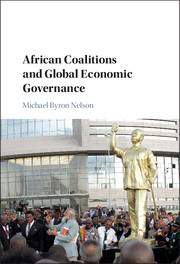Book contents
- Frontmatter
- Contents
- List of Figures
- List of Tables
- Acknowledgments
- List of Abbreviations
- 1 Introduction
- PART I THEORY AND BACKGROUND
- PART II CASES
- 5 Global Food Safety Governance and Africa
- 6 Global IP Governance and African Coalitions
- 7 Africa and the Governance of Agricultural Trade
- 8 Conclusion
- Bibliography
- Index
8 - Conclusion
from PART II - CASES
Published online by Cambridge University Press: 05 September 2016
- Frontmatter
- Contents
- List of Figures
- List of Tables
- Acknowledgments
- List of Abbreviations
- 1 Introduction
- PART I THEORY AND BACKGROUND
- PART II CASES
- 5 Global Food Safety Governance and Africa
- 6 Global IP Governance and African Coalitions
- 7 Africa and the Governance of Agricultural Trade
- 8 Conclusion
- Bibliography
- Index
Summary
Global economic governance matters to African states; the stakes are arguably higher for them than they are for most other countries. Participating in governance, however, taxes the resources of even the most developed states. It is no wonder that African states have a difficult time keeping up. That said, they do occasionally influence decisions made by other states and international organizations. To do so, they normally must join together or with other countries as coalitions. Our question has been, how do the varying structures of global governance affect coalitional behavior? This book has addressed this question by generating and establishing the plausibility of propositions linking institutional system characteristics to coalition successes for African states.
Distinctive characteristics of individual institutions and institutional systems affect coalition-based strategies. In the case of individual institutions, we should pay special attention to the decision-making rules and culture of the institution, as well as the ability of states to use extrainstitutional carrots and sticks to persuade other decision makers. But much of the time decision making does not occur in isolated institutions. Sometimes not only are multiple institutions involved, but they also must be involved for full resolution of a matter. How institutional systems vary affects whether and how African states form, join, and use coalitions. The preceding chapters applied this analytical framework to African coalition practices in three distinct issue areas: food safety, intellectual property, and agricultural trade. In all three areas of governance, African states faced situations where collective action made sense. However, variations in the institutional systems affected their ability to coordinate at the national and international levels.
Two important claims underpin my argument. The first is that we should care about the behavior of African states in global economic governance. This is not an obvious assertion because many people tend to ignore African states in their analysis of these institutions. Nevertheless, this book demonstrates that focusing on African state behavior both provides a unique vantage point for analyzing international institutions and helps us to understand some specific outcomes in global governance. The second is that it makes sense to focus on coalitions. African states, resource poor as they are, typically must work together in coalitions to influence governance outcomes.
- Type
- Chapter
- Information
- African Coalitions and Global Economic Governance , pp. 237 - 246Publisher: Cambridge University PressPrint publication year: 2016



